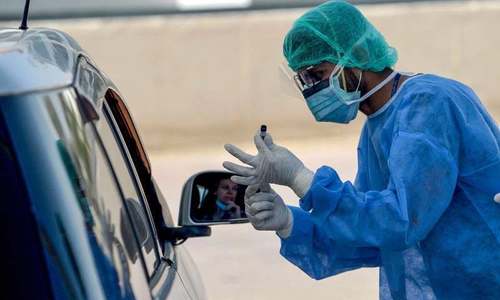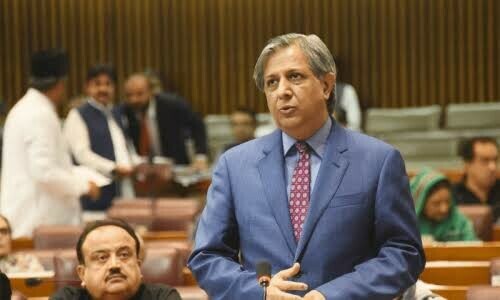KARACHI: The fraternity of medical scientists, key public health institutions and leading healthcare professionals on Wednesday launched a national survey of people tested for the coronavirus in Pakistan that the experts said would build “confirmative database” of the pandemic in the country, leading to immediate and drastic measures while helping the decision-makers to devise their strategy in line with trends and numbers.
The announcement of the launch came during a press conference, which was addressed by leading health professionals and senior medical scientists who said the survey was being initiated across the country by the Pakistan Islamic Medical Association (PIMA) in collaboration with the Health Research Advisory Board (HealthRab) and the National Institute of Health (NIH). They jointly addressed the conference through video link from different cities of the country.
They said the survey of Covid-19 tested people would help understand symptomology of the viral disease in relation to age, gender, and comorbidities. It would also bring the course of the disease with its implications into the knowledge of healthcare professionals while highlighting the psychological impact of the disease on various age groups.
Medical scientists, leading healthcare professionals say the study will help understand symptomology of the viral disease
“More importantly it would help in determining ultimate outcomes of the disease,” said Dr Zakiuddin Ahmed of HealthRab. “Around the world and mostly in the developed countries, we have seen that the numbers, data and consistent research on the virus helped them in devising their strategy which proved successful. We are making the same effort here to gather the numbers, build the strong and authentic database and then help our policymakers to go for the decision in line with the existing trend.”
Read: Covid-19: where does testing help?
Dr Mumtaz Ali Khan from the NIH said the number of coronavirus cases in the country had started dropping during the last couple of weeks but at the same time he mentioned that the figure of testing across Pakistan had also declined during the same period. However, he said the situation would become stable because the number of hospitalisations had decreased over the past few days while the availability of beds and crucial support for serious patients at the health facilities had increased during the same period.
‘Don’t repeat mistakes’
“But we don’t have to repeat mistakes during the upcoming Eidul Azha which we did during Eidul Fitr,” said Dr Khan. “We have to be very cautious and never repeat the mistakes here. We have to prove ourselves a responsible nation. There is no evidence to foresee that when we can witness another wave but around the world we have seen outbreaks one after another. So we have to live with it and stay vigilant, alert and cautious.”
Prof Afzal Mian, the PIMA president, said that his organisation from day one had been assisting the government functionaries and also helping the health facilities both from private and public sectors in terms of supplies of personal protective equipment, capacity building and providing human resource in such challenging times.
“We believe that we should make some scientific contribution and this survey actually would be the first of its kind in the country which would help in assessing this pandemic trend in Pakistan. Once it’s done we would be launching more such studies in collaboration with the local and international bodies,” he said.
Prof Dr Abdul Basit, vice chairman of HealthRab, said the outbreak of Covid-19 in the country brought several speculations and a storm of information, which over the past few months proved wrong and some was gathered to be authentic.
“For instance there was a general misconception that Covid-19 badly affects diabetes patients and people with respiratory issues,” said Prof Basit, who is also a member of the International Diabetes Federation, Diabetes Atlas Committee in Pakistan. “But now it’s a proven fact that there’s fewer than 10 per cent Covid-19 patients who are diabetics and there are one to two per cent people having respiratory issues who have been hit by the coronavirus. People of over 90 years have recovered from the disease. A majority of the patients of this disease don’t even need treatment.”
Published in Dawn, July 9th, 2020













































